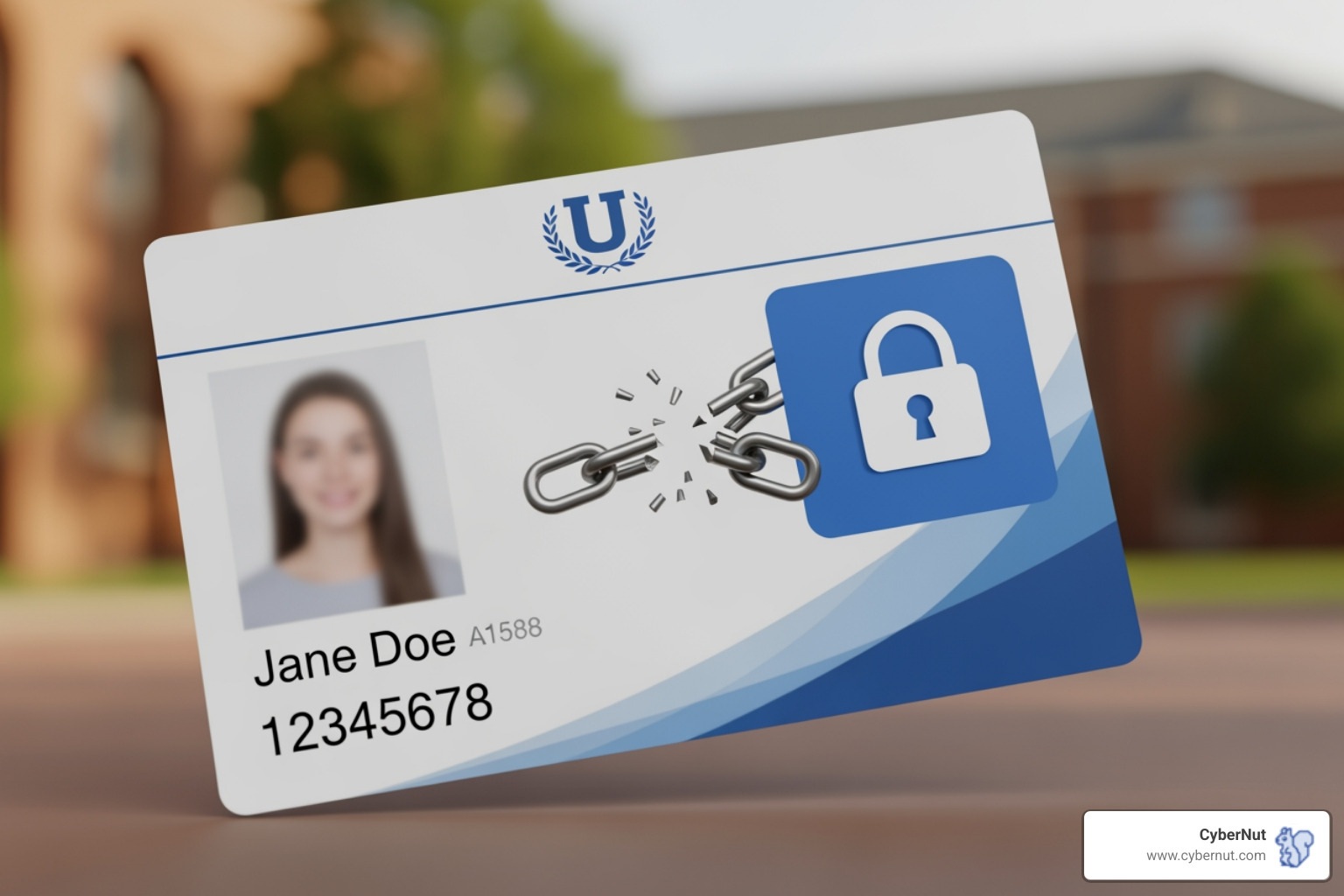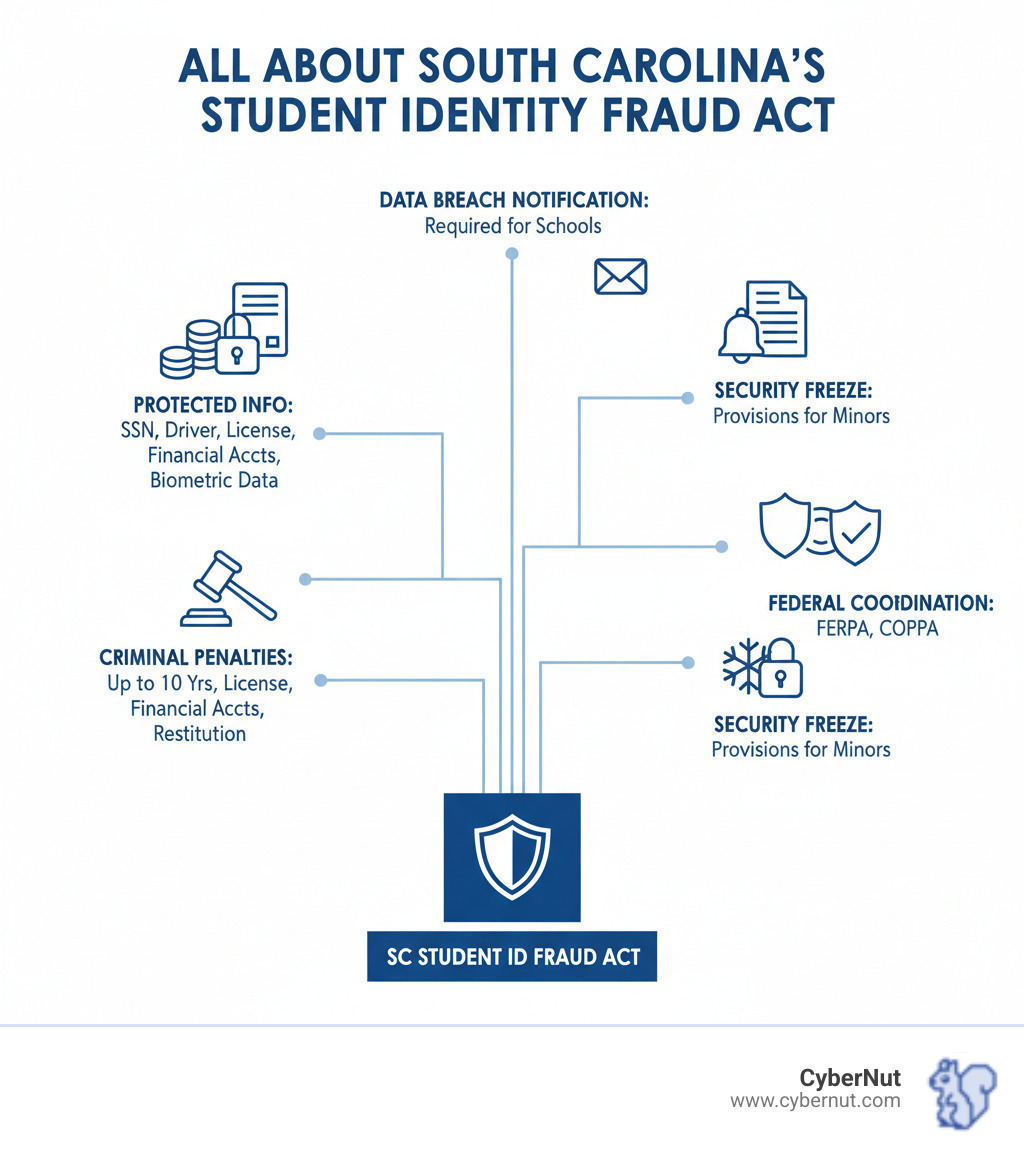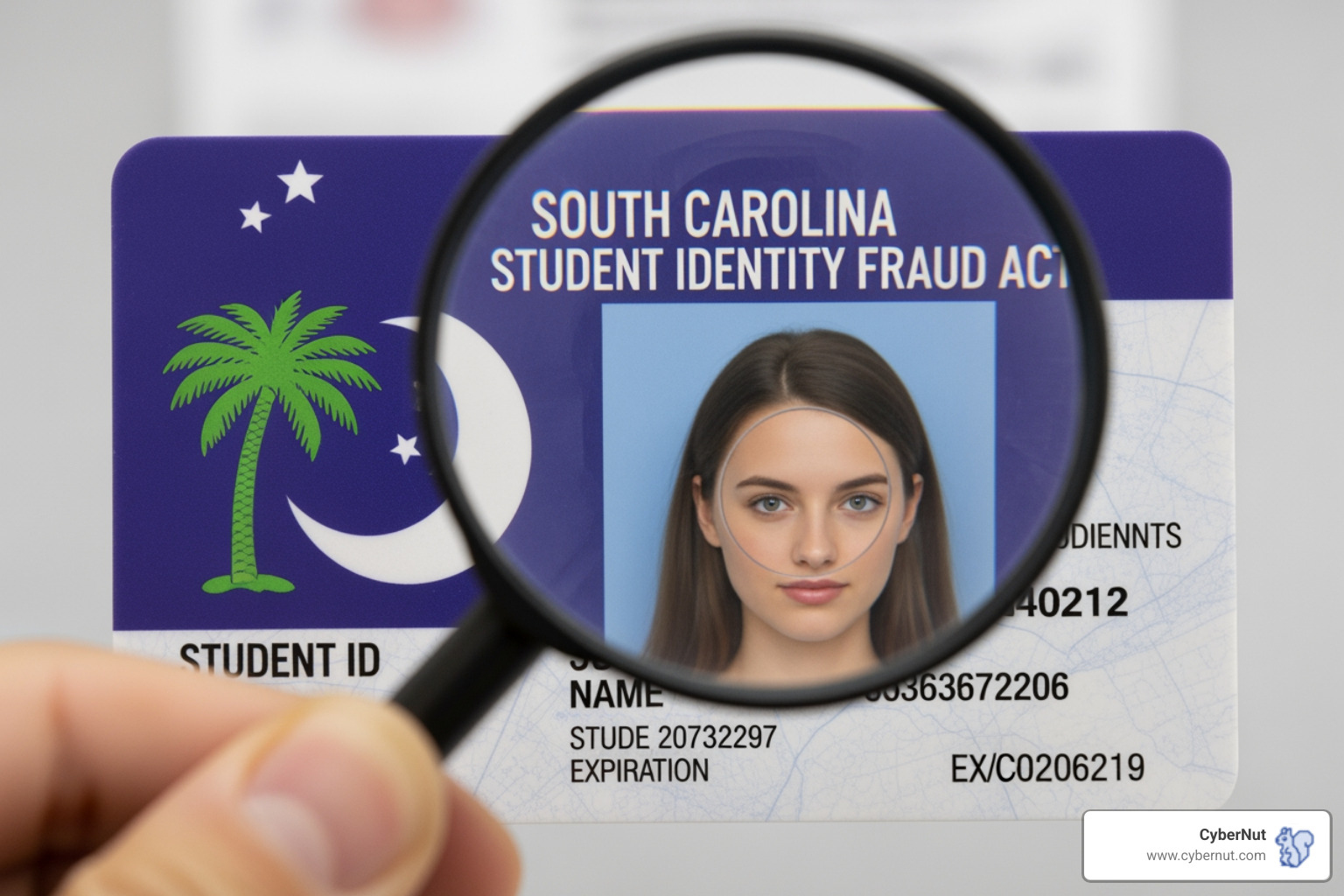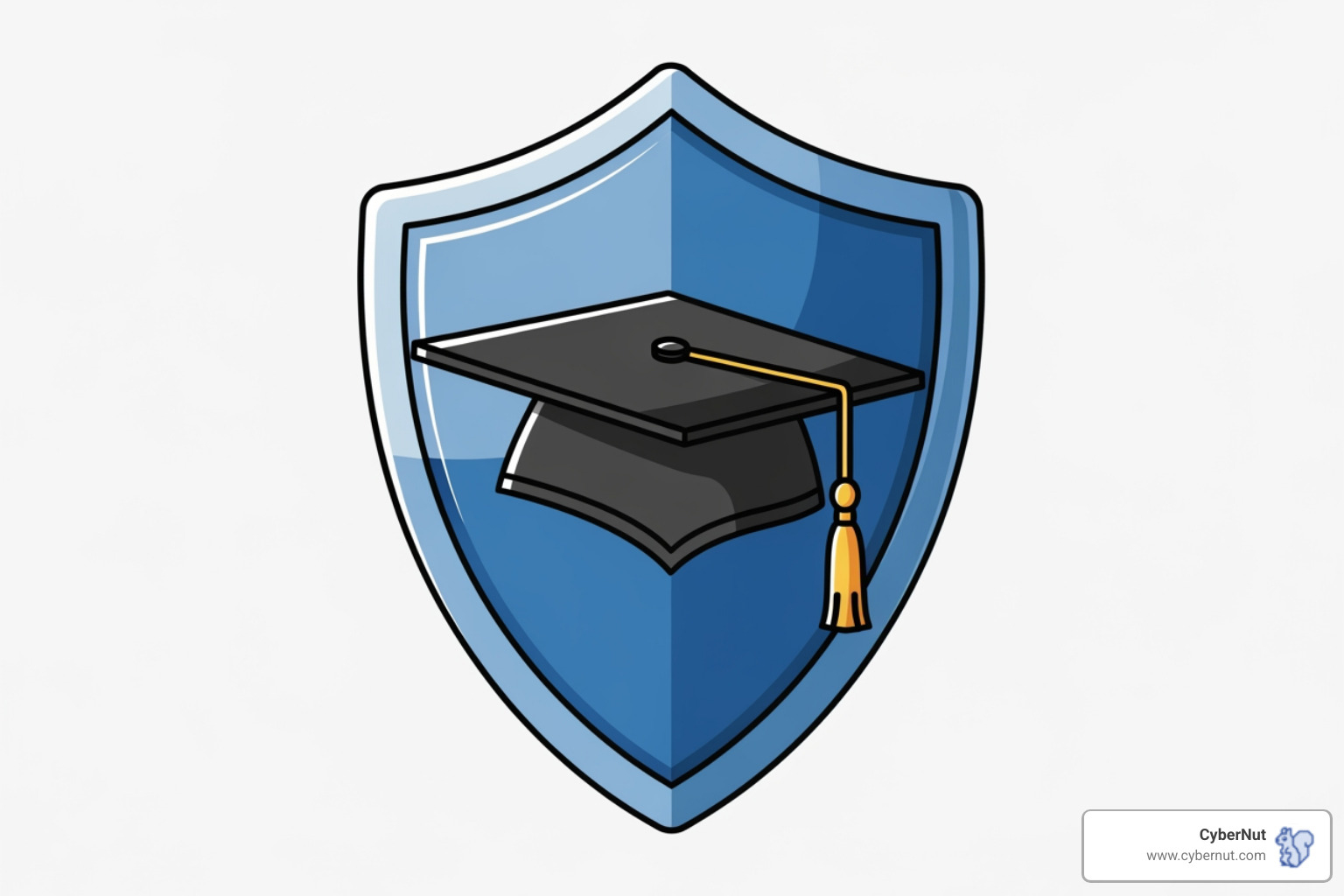
Oliver Page
Case study
November 11, 2025

All About South Carolina's Student Identity Fraud Act isn't a single law but a set of provisions within the state's broader Financial Identity Fraud and Identity Theft Protection Act (FIFITPA) that directly impact students. Here's what you need to know:
Quick Answer: Key Facts About South Carolina's Student Identity Fraud Laws
Identity theft reports to the Federal Trade Commission jumped from 371,000 in 2017 to 1.4 million in 2021. Students are particularly vulnerable because their clean credit histories and limited credit monitoring make them perfect targets for fraudsters.
As a K-12 IT Director, you're on the front lines. Your students' Social Security numbers, birth dates, and addresses are stored in your systems, and cybercriminals know it. Two-thirds of college students have used fake IDs at least once, showing how normalized identity misuse has become among young people.
South Carolina has robust laws to prosecute offenders and protect victims. The challenge is understanding these laws and implementing the right safeguards in your district before an incident occurs.

To understand All About South Carolina's Student Identity Fraud Act, you must first know the law that enables it: the Financial Identity Fraud and Identity Theft Protection Act (FIFITPA).

Enacted in 2008, 2007-2008 Bill 453: Financial Identity Fraud and Identity Theft Protection Act was a complete overhaul of how the state tackles identity fraud. FIFITPA defines identity fraud, outlines penalties, and requires organizations to notify individuals of data breaches. For K-12 schools, this means you have a legal obligation to inform families if your district experiences a data breach. The law also establishes how victims can protect themselves and gives law enforcement tools to pursue criminals. For schools handling sensitive student data, understanding these provisions is essential.
South Carolina law recognizes two types of identity fraud.
Financial identity fraud is what most people consider "identity theft." According to SC Code of Laws Section 16-13-510, this occurs when someone uses another person's identifying information to access their financial resources, such as opening credit cards or getting loans. The key element is intent to defraud for monetary gain.
Identity fraud covers non-financial misuse of another person's information. This includes identity fraud for employment—using someone else's Social Security Number to get a job—or avoiding law enforcement, like giving a fake name during a traffic stop. For students, a college student using a fake ID to buy alcohol is committing identity fraud, while stealing an identity to fraudulently claim financial aid is financial identity fraud. Both are serious crimes under South Carolina law.
The definition of personal identifying information has expanded significantly. Under South Carolina law, Personal Identifying Information (PII) includes classics like Social Security Numbers, driver's license numbers, and bank account numbers. It also covers digital signatures, biometric data (fingerprints, facial recognition), electronic identification numbers, PINs, dates of birth, and other unique identifiers.
This expansion reflects the reality of students' digital footprints. They use unique credentials for learning systems, biometric data to access devices, and electronic signatures on forms. Every piece of this information is PII under state law and requires protection. As you are responsible for student data, you're not just protecting paper files but a complex web of digital identities. Cybercriminals constantly develop new methods to steal this information, so your defenses must evolve. Getting your school audited for phishing vulnerabilities is a smart step to identify weak points before they are exploited.
A "harmless" fake ID isn't just a school discipline issue—it's a felony under South Carolina law. When discussing All About South Carolina's Student Identity Fraud Act, we're dealing with serious criminal charges with lifelong consequences, including prison time, large fines, and a permanent criminal record that can derail future opportunities.

The law covers many actions that students might consider minor but are serious crimes.
Using a fake ID is a top offense. Research shows two-thirds of college students have used fake IDs, often to buy alcohol. Under South Carolina law, possessing or presenting false identification to misrepresent your age or identity is a criminal act.
Forgery includes creating or altering any document to deceive, such as doctor's notes, permission slips, or official documents like transcripts.
Falsifying academic records involves creating fake transcripts, altering grades, or forging diplomas to gain admission, scholarships, or employment. These are prosecutable offenses that go far beyond school discipline.
Unlawful use of personal identifying information covers using someone else's Social Security Number, driver's license, or financial details without authorization. This could involve a student stealing a classmate's information for online purchases or using data from a breach.
Obtaining property by false pretenses applies when students use fraudulent means—like stolen credit cards or fake identities—to acquire goods, services, or money.
The penalties for these offenses are severe.
For general or financial identity fraud under SC Code Section 16-13-510, even a first offense is a felony. A court can impose up to 10 years in prison and discretionary fines. Courts also typically order restitution to repay victims for financial losses. A felony conviction has life-altering consequences for a young person, affecting voting rights, employment, and more.
Fake ID charges for misrepresenting age have different penalties. A first offense is a misdemeanor with fines of $100 to $200 or up to 30 days in jail, plus mandatory educational programs. Subsequent offenses bring fines up to $500 and jail terms up to 6 months. Universities also impose their own sanctions, such as suspension or expulsion.
SC Code Section 16-13-525 addresses using false documents for proof of citizenship or lawful presence, with penalties ranging from a misdemeanor to a felony for subsequent offenses.
Here's a quick reference for common student-related identity fraud penalties:
As a K-12 IT Director, ensure your students understand these are criminal laws with real consequences. Prevention starts with education and robust cybersecurity. Get your school audited for phishing vulnerabilities to identify weak points before criminals do.
All About South Carolina's Student Identity Fraud Act is not just about punishment; it's about creating a safety net for students. The law protects students who are victims while holding those who commit fraud accountable. As a K-12 IT Director, you must steer a complex landscape where state and federal regulations intersect to protect student data.

South Carolina's laws recognize students as both potential victims and perpetrators.
Protections for minors are robust. Children are prime targets for identity thieves due to their clean credit histories. A fraudster can use a child's Social Security Number for years without detection. To combat this, South Carolina law allows parents to place security freezes on protected consumers' credit files. This locks a child's credit report, preventing new accounts from being opened without authorization and serving as a powerful tool against synthetic identity fraud.
School data breach liability is a critical component. Schools must comply with the act's data breach notification requirements. If your district experiences a breach of unencrypted student data, you are legally required to notify affected families promptly. As seen in cases like the Cyberattack Fallout: Lawsuit Targets South Carolina School District, inadequate cybersecurity can lead to severe legal consequences. Your student information systems contain a wealth of data attractive to thieves, making robust cybersecurity a legal and ethical necessity. If you're unsure of your vulnerabilities, consider an audit at https://www.cybernut.com/phishing-audit.
The act also addresses student perpetrators. When a student uses a fake ID or falsifies records, they face serious penalties, from fines to felony charges, ensuring accountability.
South Carolina's laws work in concert with federal regulations to create a comprehensive shield around student data.
The Family Educational Rights and Privacy Act (FERPA) protects the privacy of student education records at schools receiving federal funds. It requires parental consent to disclose a minor's records. While state law sets penalties for fraud, FERPA establishes the baseline for how records must be handled. Violations can lead to a loss of federal funding.
The Children's Online Privacy Protection Act (COPPA) applies to the ed-tech tools your district uses. It requires verifiable parental consent before collecting personal information from children under 13 and mandates that operators maintain reasonable security. When vetting new software, ensure it is COPPA compliant.
The Gramm-Leach-Bliley Act (GLBA) is relevant when your school handles financial information, such as for financial aid or lunch programs. It requires institutions to safeguard sensitive financial data. Vendors processing student payments must comply with GLBA's security requirements.
This multi-layered approach combines state-level criminal penalties and breach notifications with national standards for data privacy and security, creating a comprehensive legal framework that protects students from multiple angles.
Finding that you or a student is a victim of identity fraud is overwhelming. However, clear paths exist for reporting fraud and recovering. South Carolina and federal agencies have established specific mechanisms to help. As an IT Director, you can guide students and families through this process. The South Carolina Department of Education also works to protect student data and address cybersecurity concerns.
Time is critical. Acting fast can prevent further damage. Here are the immediate steps to take.
First, contact the three major credit bureaus: Equifax, Experian, and TransUnion. Notify their fraud units and request a fraud alert on the credit file. This makes it harder for fraudsters to open new accounts. You can find their fraud centers online: Equifax's fraud alert center, Experian's fraud center, and TransUnion's fraud alert page.
Next, file a police report with local law enforcement. This official report is often necessary for disputing fraudulent charges and dealing with creditors.
Contact institutions where fraudulent accounts were opened and close them immediately. Speak with their security or fraud departments.
File a complaint with the Federal Trade Commission (FTC) at ReportFraud.ftc.gov. This helps the FTC track theft trends and provides you with an official Identity Theft Report.
Finally, monitor credit reports closely. You are entitled to a free report from each major agency every 12 months via AnnualCreditReport.com. Check them frequently for suspicious activity.
South Carolina provides specific resources for victims under the provisions of All About South Carolina's Student Identity Fraud Act.
The South Carolina Department of Consumer Affairs Identity Theft Unit offers state-specific guidance on identity theft and victim protection under FIFITPA. Reach them at the SC Department of Consumer Affairs Identity Theft Unit.
The Federal Trade Commission (FTC) provides recovery plans and step-by-step guides at ReportFraud.ftc.gov.
The three major credit bureaus—Equifax, Experian, and TransUnion—are your frontline defense. Regularly checking reports via AnnualCreditReport.com is a key preventative measure.
Law enforcement agencies, including local police and the State Law Enforcement Division (SLED), investigate these crimes and help victims.
This interconnected system of credit bureaus, law enforcement, and state agencies provides victims with multiple avenues for support. Since many cases start with data breaches, consider your district's vulnerability. Getting a phishing audit can identify weak points before they're exploited.
South Carolina's Financial Identity Fraud and Identity Theft Protection Act (FIFITPA) provides a powerful framework to protect students. It defines identity fraud, outlines what constitutes personal information, sets serious penalties for violators, and includes specific protections for minors through security freezes and data breach notifications. This law works with federal regulations like FERPA, COPPA, and the Gramm-Leach-Bliley Act to create a comprehensive safety net.
However, laws alone are not enough. As K-12 IT Directors and administrators, you guard sensitive student data that cybercriminals actively target. A single successful phishing attack can lead to a devastating data breach.
Prevention begins with education. Teaching students about digital citizenship, the consequences of identity fraud, and training staff to recognize phishing attempts builds a "human firewall." This creates a culture of cybersecurity awareness throughout your schools.
At CyberNut, we've seen how effective targeted training can be. Our automated, gamified micro-trainings are designed for the unique challenges of K-12 environments. Our approach is low-touch but high-impact, making cybersecurity engaging for students and staff, turning compliance training into an interactive learning experience.
The best time to strengthen your defenses was yesterday. The second-best time is right now. We invite you to take two proactive steps today: First, get your school audited for phishing vulnerabilities to find where your security gaps might be hiding. Second, explore how you can protect your students with comprehensive cybersecurity training that actually works.
Together, we can create schools where students are protected not just by laws, but by the knowledge and vigilance of a community committed to their safety.

Oliver Page

Some more Insigths


Back